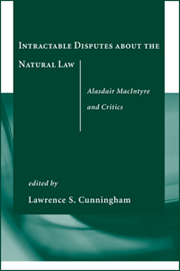
Formally welcoming University of Notre Dame alumnus Miguel H. Diaz as U.S. ambassador to the Vatican earlier this month, Pope Benedict XVI praised American democratic pluralism and promised to enrich it.
“For her part,” Pope Benedict said, “the Church in the United States wishes to contribute to the discussion of the weighty ethical and social questions shaping America’s future by proposing respectful and reasonable arguments grounded in the natural law and confirmed by the perspective of faith.”
The invocation of “natural law,” and Pope Benedict’s (and the Church’s) conviction that certain moral imperatives are inherent in human nature, could hardly have surprised Diaz, who holds master’s and doctoral degrees in theology from Notre Dame.
Nor could it have surprised Notre Dame’s president, Rev. John I. Jenkins, C.S.C., who five years earlier, as president-elect, had received a letter from Cardinal Josef Ratzinger, then prefect for the Congregation for the Defense of the Faith, expressing the urgency of finding a “common denominator” of universal moral principles and requesting Notre Dame’s assistance in the search. Cardinal Ratzinger had invited Notre Dame, as well as the Catholic University of America and Ave Maria Law School, to put together plans for academic symposia to explore this enigmatic issue and report to the congregation by the end of 2005.
Subsequent events disrupted that schedule, not the least of them being the death of Pope John Paul II and the election of his successor. Six months after writing his letter, Cardinal Ratzinger had become Pope Benedict XVI, and Father Jenkins had been inaugurated as Notre Dame’s 17th president.
Nevertheless, Father Jenkins wanted to respond to the former cardinal’s invitation and formed a committee of Notre Dame theologians and philosophers, including Alasdair MacIntyre, John A. O’Brien Senior Research Professor of Philosophy, to do so.
Father Jenkins was able to bring with him the fruits of their labor, a symposium in the form of a book, when he went to Rome in February of 2006 for a meeting of Notre Dame’s Board of Trustees. He carried two copies of it with him, one for the present prefect of the Congregation for the Defense of the Faith, Cardinal William Levada, and another for the former prefect, now Pope Benedict XVI.
Now published by the University of Notre Dame Press and titled “Intractable Disputes About the Natural Law: Alasadair MacIntyre and his Critics,” the book, edited and introduced by Lawrence S. Cunningham, Notre Dame’s John A. O’Brien Professor of Theology, includes essays on natural law and rights by nine scholars—theologians, canon and civil lawyers, political scientists and philosophers.
Flanking the book are two essays by MacIntyre. The first, from which “Intractable Disputes” takes its title, is an exposition of crucial arguments concerning natural law. The last, “From Answers to Questions,” concerns the eight essays written in response by David A. Clairmont, assistant professor of theology at Notre Dame; Rev. John J. Coughlin, O.F.M., professor of law in the Notre Dame Law School; Rev. Kevin J. Flannery, S.J., professor of philosophy at the Pontifical Gregorian University in Rome; Thomas Hibbs, dean of the honors college at Baylor University; Cathleen Kaveny, John M. Murphy Foundation Professor of Law at Notre Dame; Gerald McKenny, professor of theology at Notre Dame; Daniel Philpott, associate professor of political science at Notre Dame; and Jean Porter, John A. O’Brien Professor of Theology at Notre Dame.
According to one early reviewer, Stephen J. Pope of Boston College, the book is “lucid, engaging, and intellectually sophisticated. ‘Intractable Disputes about the Natural Law’ is a must-read not only for moral theologians, but for anyone concerned about the conceptual foundations of human rights, human dignity, and moral dialogue in pluralistic societies.”
Pope Benedict, concerned about all of those things, and much more, has yet to write his review, but his invitation has given rise to some formidable reading.
Contact: Kathryn Pitts, Notre Dame Press, 574-631-3267, pitts.5@nd.edu